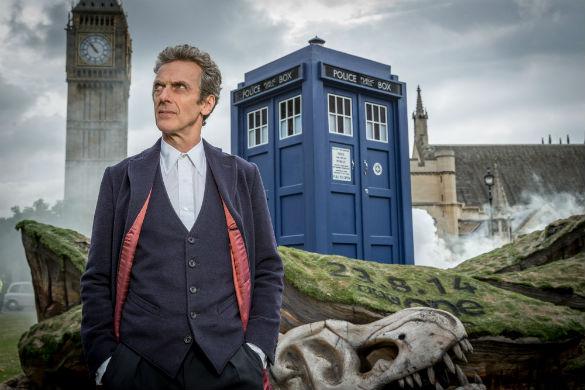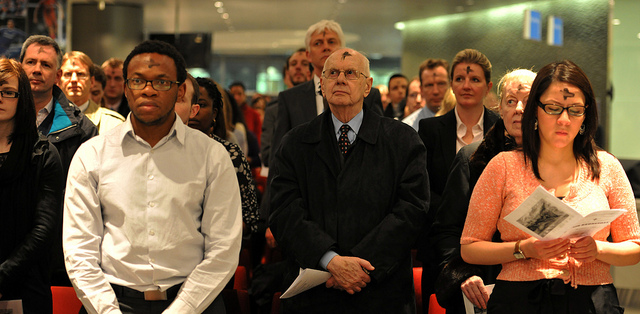How often is the combustion of a dinosaur in nineteenth century London the start of an investigation that leads to a cyborg who steals body parts of human beings so that he can stay alive until he reaches the promised land? Oh, and the investigation is headed by a time traveling alien? Welcome to the eighth season of Doctor Who.
Doctor Who has a long history, celebrating its 50th anniversary last year. Throughout this time, one thing has remained constant: the Doctor’s commitment to helping others and doing so more by wit and wisdom than force and power. As fans have long noted, he is a “doctor”, carries not a gun but a sonic screwdriver, and has, as an alien, two hearts instead of one.
“The Time of the Doctor”, the final episode from season seven, displayed this approach well. The Time Lords, the alien race to which the Doctor belongs, are trapped outside of the universe and trying to return through a crack on the planet Trenzalore, but their return would usher in a new war destroying the universe. (Time Lords, on the whole, are not as helpful as the Doctor.) All of the Time Lords’ enemies have amassed around Trenzalore to destroy the planet in hopes of preventing the Time Lords’ return. The Doctor’s response is to take up residence for 300 years on the planet to both stop the enemies from destroying the people on the planet and keep the Time Lords at bay. It is, what Catholic social teaching would call, an act of solidarity.
This is what has always attracted me to Doctor Who: the ability to overcome evil and violence by using one’s heart and head. The show implies an understanding of the universe where care for others and creativity of mind are the final word. It is, at least for me, a very Christian vision of creation. It is the idea that, instead of responding to social and political evils with legions of angels, God sent his only begotten son so that we might have life. God overcomes evil through reconciliation and love. This belief, that love is the most powerful force in the universe, has animated so many Christians throughout history, including recently the movement of pastors and clergy into the streets of Ferguson to calm police and protesters in hopes of preventing further loss of life.
In the premier this weekend, “Deep Breath”, though, a no less consistent but secondary theme was on display. The Doctor regenerated (part of being a Time Lord means that you get to live 12 lives (13 in special cases)). In the climax of the story, the Doctor is facing down the cyborg that has been killing people and using their parts to replace his failing robotics and stay alive. The cyborg is basically a serial killer who has rationalized his evil and refuses to change. In their final exchange, the Doctor gives the cyborg a chance to stop, a choice that will mean he dies, or the Doctor will kill him.
Cyborg: It cannot end.
The Doctor: It has to.Cyborg: Self-destruction is against my basic programming.
The Doctor: Murder is against mine.. . . . .
The Doctor: You realize of course, one of us is lying about our basic programming.
Cyborg: Yes.
The Doctor: And I think we both know who that is.
There is a cut-away scene, and, when the story returns to the Doctor and the cyborg, the cyborg is dead. There is an ambiguity here: did the Doctor kill him or did the cyborg commit suicide? In either case, it embodies a limit that the Doctor faces when he is confronted by implacable foes bent on destruction. The Doctor will stop them, but, at times, he cannot do so with cleverness and mercy. He reluctantly and, with a sense of his own failure, will fight to stop the evil.
These violent actions so go against the grain of the Doctor that the one regeneration of the Doctor who took up arms is shrouded and hidden. When the eleventh Doctor final confronts this War Doctor, the War Doctor defends himself saying, “What I did, I did without choice. . . . In the name of peace and sanity.” The eleventh Doctor’s response was simply, “But not in the name of the Doctor.”
I think we are too often confronted with these kinds of limits. In his press conference about ISIS, Pope Francis seems to articulate both our need to and dread of taking up arms:
In these cases where there is unjust aggression, I can only say that it is licit to stop the unjust aggressor. I underscore the verb “stop”; I don’t say bomb, make war — stop him. The means by which he may be stopped should be evaluated. To stop the unjust aggressor is licit, but we nevertheless need to remember how many times, using this excuse of stopping an unjust aggressor, the powerful nations have dominated other peoples, made a real war of conquest. A single nation cannot judge how to stop this, how to stop an unjust aggressor. After the Second World War, there arose the idea of the United Nations. That is where we should discuss: “Is there an unjust aggressor? It seems there is. How do we stop him?” But only that, nothing more.
This, I think, is where Time Lords (and us humans) run into our limits. There are times and places where we know we must stop the progress of evil, but the only way we see of doing so at that time and place seems to be with force. Whatever caused the evil to arise is in the past, and we cannot go there. The inevitable reprisal of using force is in the future, and we cannot foresee and so forestall it. Action for the protection of others must be taken here and now.
As Christians, here is where we must trust in the Lord of Time, God. The hope we have is not just for God to fix the wounds of creation that are present now but also to reach back into humanity’s past to heal these wounds and to bring all of creation to a future where God “will wipe every tear from [our] eyes, and there shall be no more death or mourning, wailing or pain, [for] the old order has passed away.” (Revelation, 21:4)






Force is one thing, violence, killing, bombing people, and war is quite another.
The U.S. Is far too quick to use violence when we ought to be fully engaging non-violent methods.
God bless.